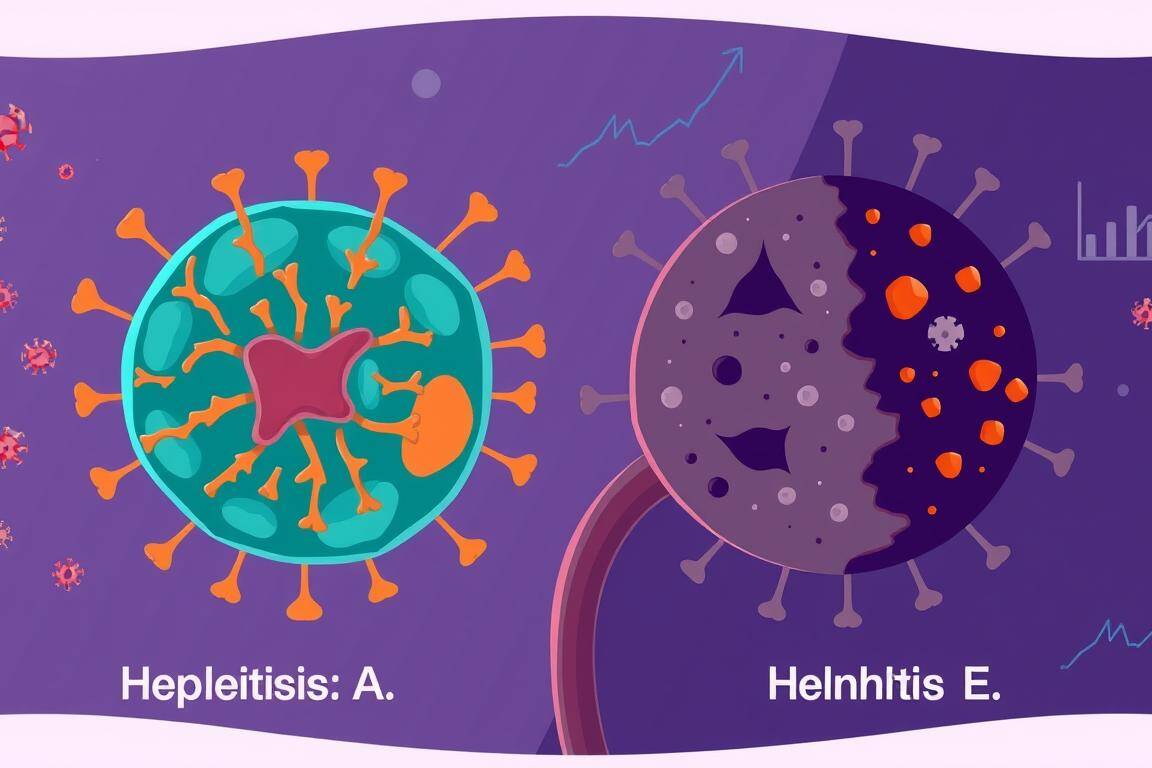Are you worried about hepatitis B and its effects on your health? You’re not alone. This virus affects about 296 million people globally and can cause serious liver problems if not treated. But, researchers are working hard to find a cure for hepatitis B. In this article, we’ll look at the newest research and treatment options that could change the future for those with chronic hepatitis B.
Table of Contents
ToggleHepatitis B is a tough disease that targets the liver. Current treatments help manage it, but they don’t cure it fully. There are two main types of treatments: immune modulator drugs that boost the body’s defense and antiviral drugs that slow the virus down. Researchers aim to find a way to get rid of the hepatitis B virus for good, and they’re making progress.
Next, we’ll dive into the newest findings in hepatitis B research. We’ll look at potential treatments that could change how we handle this disease. From new clinical trials to innovative drugs, you’ll learn about the exciting advances in finding a cure for hepatitis B.
What is Hepatitis B?
Hepatitis B is a serious viral infection that attacks the liver. It can cause both short-term and long-term illness. The virus spreads through contact with infected blood or other bodily fluids. This can happen during childbirth, unprotected sex, or through contaminated needles or sharp objects.
Transmission and Global Impact
As of 2019, the World Health Organization (WHO) reported that about 296 million people were living with hepatitis B. That year, the virus led to around 820,000 deaths. This makes hepatitis B a major global health issue.
The virus is most common in sub-Saharan Africa and parts of Asia. It often spreads from mother to child during childbirth or in early childhood.
- Hepatitis B is most commonly transmitted through contact with infected blood or other bodily fluids.
- The virus can be passed on from mother to child during childbirth or in early childhood.
- Globally, an estimated 296 million people were living with hepatitis B in 2019, resulting in 820,000 deaths.
Understanding how hepatitis B spreads is key to tackling this health issue. By spreading awareness and using effective prevention and treatment, we can lessen the virus’s global impact.
Living with Chronic Hepatitis B
Living with chronic hepatitis B can feel overwhelming, but there is hope. This condition, lasting over six months, can lead to serious issues like liver damage and cancer. Symptoms like stomach pain, tiredness, and nausea can affect your daily life a lot.
The emotional side can be tough too. You might worry about telling others about your condition and fear passing the virus to your loved ones. This fear can make you feel alone and stressed.
Stigma around hepatitis B can make you feel cut off from others, leading to depression and anxiety. This can really lower your quality of life. But, you’re not alone. With the right medical care and support, you can manage your chronic hepatitis B and live well.
Getting a cure for hepatitis B would make a huge difference. It would ease the physical and emotional strain of this condition.
- Chronic hepatitis B can lead to serious long-term health issues, including liver damage, cirrhosis, and liver cancer.
- Physical symptoms such as abdominal pain, fatigue, nausea, and vomiting can take a toll on daily life.
- The psychological impact of chronic hepatitis B, including fear of disclosure and transmission, can lead to social isolation, depression, and anxiety.
- A cure for hepatitis B would greatly improve the quality of life for those living with this chronic condition.

Current Hepatitis B Treatments
If you’ve been diagnosed with hepatitis B, you’ll find several effective treatments. These treatments include hepatitis b immune modulator drugs and hepatitis b antiviral drugs.
Immune Modulator Drugs and Antivirals
Immune modulator drugs, like interferons, are given as shots. They are taken for 6 months to a year. These medications boost your immune system to fight the hepatitis B virus.
Heatitis B antiviral drugs like lamivudine and tenofovir are taken daily as pills. They slow down or stop the virus from making more copies. This can help control the infection and lower the risk of serious liver disease.
Even though these treatments help manage hepatitis B, they don’t cure the virus. The virus can still be in your body, even if it’s under control. You’ll need regular check-ups and long-term treatment to keep the virus in check.
The Quest for a Functional Cure
The main aim in hepatitis B research is to find a “functional cure.” This means a treatment that keeps hepatitis B DNA levels very low and removes the virus’s surface antigens after treatment ends. Such a cure would help prevent liver cancer and mimic the body’s natural fight against the infection.
But finding a complete cure for hepatitis B is hard. The virus stays in the body because of the covalently closed circular DNA and integrated DNA fragments. These make it tough to get rid of the virus completely.
Researchers are looking into new ways to overcome these hurdles. They’re exploring combination therapies, gene-editing, and vaccines to find a cure for hepatitis B. These methods could lead to a breakthrough in treating the disease.

The push for a functional cure for hepatitis B aims to better patient outcomes and lessen the disease’s impact. As research moves forward, the hope of a future without hepatitis B grows stronger.
Hepatitis B Cure: Promising New Drug Candidates
The search for a cure for hepatitis B has been ongoing. The research community is making steady progress. Several promising new drug candidates have emerged, offering hope for those living with this chronic liver disease.
One of the most notable developments is the investigational antisense medicine bepirovirsen. It’s designed to stop the production of viral proteins linked to hepatitis B. This approach aims to disrupt the virus’s life cycle and potentially lead to a functional cure.
Barinthus Biotherapeutics has also made strides with their novel antigen-specific immunotherapy VTP-300. This vaccine is meant to boost the immune system to better recognize and eliminate the hepatitis B virus.
Researchers at Helmholtz Munich have developed a new vaccine called TherVacB. It has recently started clinical trials. This vaccine aims to improve the body’s defenses against the hepatitis B virus.
These new drug candidates, along with ongoing research, are paving the way for potential breakthroughs. As the development of new hepatitis b drugs and hepatitis b cure research continues, the future looks promising for those affected by this persistent global health challenge.
The emergence of these hepatitis b drug development initiatives shows the dedication and determination of the scientific community. By using cutting-edge technologies and innovative approaches, researchers are getting closer to a functional cure for this chronic disease.
Bepirovirsen: A Phase 3 Clinical Trial
Researchers are working hard to find a cure for hepatitis B. One promising drug is bepirovirsen. It’s made by GSK and Ionis Pharmaceuticals. This drug stops the virus from making proteins.
B Well-1 and B Well-2 Studies
The companies started two phase 3 clinical trials, B Well-1 and B Well-2. These studies look at how well bepirovirsen works with other treatments. They aim to lower HBsAg and HBV DNA levels. They also want to see if the effects last after treatment stops.
The B Well-1 and B Well-2 studies are key in finding a cure for hepatitis B. They will show if bepirovirsen is safe and effective.

Everyone is waiting for the results of these studies. If bepirovirsen works, it could be a big step towards curing hepatitis B. This disease is tough on the liver.
Barinthus Biotherapeutics’ VTP-300
Barinthus Biotherapeutics, once known as Vaccitech, is changing the game in hepatitis B treatment. Their VTP-300 is a new way to fight chronic hepatitis B infection. It’s a game-changer.
The first trials of VTP-300 showed great promise. In a phase 1b/2a trial, patients saw significant drops in HBsAg levels. This is a big deal because it’s a step towards curing hepatitis B.
Barinthus has shared new data from its phase 2b and 2a trials. These studies show that VTP-300 can greatly reduce HBsAg levels when used with other treatments. This is a big sign of its potential.
As Barinthus Biotherapeutics keeps testing VTP-300, everyone is watching. This new treatment could bring hope to those with chronic hepatitis B.
TherVacB: A Therapeutic Vaccine
The search for a cure for hepatitis B is ongoing, and TherVacB is a leading candidate. It was created by Helmholtz Munich researchers. The vaccine has been tested a lot before and is now in a trial to see if it’s safe and works well in healthy people.
TherVacB is a big deal in hepatitis B research. It’s different from regular vaccines because it targets people who already have the virus. It aims to boost their immune system to fight and maybe even get rid of the virus. This could lead to a cure for chronic hepatitis B.
Now, they’re getting ready for a trial to test TherVacB in people with chronic hepatitis B. This trial will look at how safe and effective the vaccine is. It’s a key step in seeing if it could change the way we treat this disease.
We’re all watching for the trial results. The development of TherVacB is a big step forward in fighting hepatitis B. With its new approach and early promising results, it could start a new chapter in treating this global health issue.
- TherVacB is a therapeutic vaccine developed by researchers at Helmholtz Munich.
- It has completed preclinical testing and is now in a phase 1a clinical trial to assess safety and immunogenicity.
- Preparations are underway for a phase 1b/2a trial to evaluate the safety and efficacy of TherVacB in patients with chronic hepatitis B.
- TherVacB is designed to stimulate the immune system of individuals already infected with the hepatitis B virus (HBV), potentially leading to a functional cure.
Barriers to Hepatitis B Cure Progress
Even with more treatments in trials, finding a cure for hepatitis B is slow. The challenges to cure hepatitis B are many, making it hard for researchers and drug makers.
The virus itself is a big problem. It has a complex life cycle and hides in the liver, avoiding the immune system. This makes it tough to get rid of the virus, even with current treatments.
Understanding how the immune system fights the virus is another hurdle. Researchers are trying to figure out how the virus and immune system interact. This is key to making better treatments.
Also, making new hepatitis B drugs is slow because of high costs and long clinical trials. These studies need to be big and long to prove if a treatment works and is safe.
To beat these challenges, everyone must work together. This includes researchers, drug companies, and groups that make rules. More money for research and easier rules could speed up finding a cure for this tough disease.
Even with the hurdles, there’s hope in hepatitis B research. With ongoing scientific progress and a strong drive to cure, the future might bring good news for those with chronic hepatitis B.
Conclusion
Hepatitis B is a big health issue worldwide, touching the lives of millions. While we have treatments, finding a full hepatitis B cure is still a goal. New drugs like bepirovirsen, VTP-300, and TherVacB bring hope for a cure soon.
Keep up with the latest on hepatitis B treatment options and research. The fight for a cure is long, but scientists and those with the disease are hopeful. We can beat this challenge together, making a big difference in people’s lives.
Your fight with hepatitis B goes on, but so do the advances in treatment. With a strong push for a cure, there’s hope. Keep looking out for your health, speak up for it, and join in the fight against this disease.
FAQ
What is hepatitis B?
Hepatitis B is a viral infection that affects the liver. It can cause both short-term and long-term disease. It spreads mainly during childbirth or through contact with blood and other fluids.
How widespread is hepatitis B globally?
The World Health Organization (WHO) says hepatitis B affects about 296 million people worldwide. In 2019, it led to around 820,000 deaths.
What are the symptoms and consequences of chronic hepatitis B?
Chronic hepatitis B can cause serious health problems like liver damage and liver cancer. Symptoms include stomach pain, feeling tired, and vomiting. It can also affect mental health, causing fear and stigma.
What are the current treatment options for hepatitis B?
There are two main types of treatments for hepatitis B. Immune modulator drugs help boost the immune system. Antiviral drugs stop the virus from spreading. These treatments help manage the virus but don’t cure it.
What is the goal for a hepatitis B cure?
The goal is to find a “functional cure” for hepatitis B. This means having undetectable virus levels and no surface antigens after treatment. It would be like naturally clearing the infection, reducing cancer risk.
What are some of the promising new drug candidates for a hepatitis B cure?
New drugs like bepirovirsen and VTP-300 show promise. Bepirovirsen stops viral proteins. VTP-300 is an immunotherapy. A vaccine called TherVacB is also in trials, aiming to fight the virus.
What are the challenges in finding a complete cure for hepatitis B?
Finding a full cure is hard because the virus hides in the liver. It also leaves behind DNA that keeps the virus going. These hurdles make curing hepatitis B a complex task.
Source Links
About The Author

Medically reviewed by Dr. Nivedita Pandey, MD, DM (Gastroenterology)
Senior Gastroenterologist & Hepatologist
Dr. Nivedita Pandey is a U.S.-trained gastroenterologist and hepatologist with extensive experience in diagnosing and treating liver diseases and gastrointestinal disorders. She specializes in liver enzyme abnormalities, fatty liver disease, hepatitis, cirrhosis, and digestive health.
All content is reviewed for medical accuracy and aligned with current clinical guidelines.
About Author | Instagram | Linkedin





